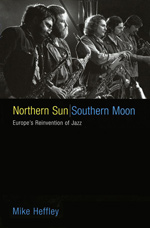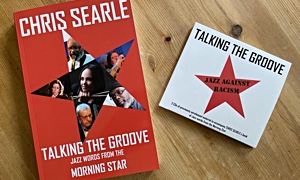Home » Jazz Articles » Book Review » Northern Sun, Southern Moon: Europe
Northern Sun, Southern Moon: Europe
 Mike Heffley
Mike Heffley Northern Sun, Southern Moon: Europe's Reinvention of Jazz
Yale University Press
ISBN: 0300106939
400 pages
2005
While improvised music in Europe has certainly had a storied history, despite being decidedly more "condensed" temporally than its American counterpart, this history is something that has often been overlooked in the canon of English-language jazz studies (in fact, European jazz is significantly overlooked in European musicology, probably more so than in America). To be sure, this is often a result of the perception that European jazz has nothing to do with slavery and the tradition of oppression that spawned the blues and jazz in America—yet this reasoning leaves to the side a case for Europe's own cultural heritage, tumultuous ethnic divisiveness, and rich aesthetic tradition as spawning that very same "cry" that imbues Afro-American musical culture.
Noted jazz critic and ethnomusicologist Mike Heffley has, in Northern Sun, Southern Moon, given an English-language voice to both the body of music and the body of criticism that has surrounded improvisational work in Germany (Western and Eastern), France, England, Holland, Poland, the Czech Republic, Scandinavia and Russia over the past fifty years. Yet unlike some of his contemporaries, Heffley goes beyond immediate aesthetic criticism of the music and the immediate sociopolitical factors it has reacted against, choosing instead to invoke Baroque traditions to discuss jazz as an art stemming from both reconstruction and fervor. To be sure, much of western literature and the Continent's men of arts and letters (Theodor Adorno, for one) have had a tremendous disdain for jazz and improvisational music, even as it may be used as a model for socio- cultural and aesthetic ideas.
Heffley is well-versed in modern philosophy, as his use of Husserl's diagram of time and memory shows (Chapter Six, based on an analysis of Alexander von Schlippenbach's "Sun ), particularly interesting as it discusses a music rooted in the experiential, expansive notion of time that subsumes memory to direct, physical experience. Time, as it applies to the directness of lived time as well as time in a cultural-evolutionary sense, is what Heffley uses to tie in European free improvisation with the other folk- and art-musics of the world: namely, that in expressing cultural memory via the "cry," this music carries with it a direct aesthetic experience that is completely its own and not beholden to anything outside itself. Northern Sun, Southern Moon has perfectly captured one of the joyous ironies in ethnomusicology.
< Previous
Live at the House of Tribes
Next >
The Cave
Comments
Tags
For the Love of Jazz
 All About Jazz has been a pillar of jazz since 1995, championing it as an art form and, more importantly, supporting the musicians who create it. Our enduring commitment has made "AAJ" one of the most culturally important websites of its kind, read by hundreds of thousands of fans, musicians and industry figures every month.
All About Jazz has been a pillar of jazz since 1995, championing it as an art form and, more importantly, supporting the musicians who create it. Our enduring commitment has made "AAJ" one of the most culturally important websites of its kind, read by hundreds of thousands of fans, musicians and industry figures every month.






















